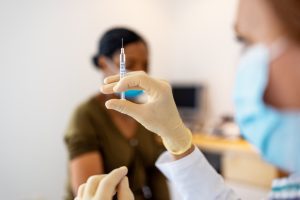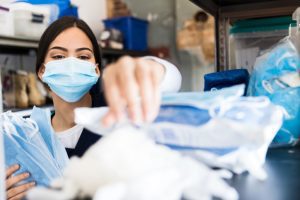For 20 years, Owens & Minor has worked with Oregon Health & Science University (OHSU), a top-ranked Pacific Northwest (PNW) hospital that includes a children’s hospital considered one of the best in the nation, the Center for Health and Healing Complex and the Knight Cancer Institute. Through a longstanding relationship with OHSU, Owens & Minor has seen them grow to approximately 576 beds, a patient volume of 300K, more than a million patient visits and 16,000 employees.
Along the way, Owens & Minor has evolved their practices and solutions to better serve this renowned hospital and be the partner they need as they continue to grow. OHSU has faced several supply chain challenges—from time-consuming manual processes responding to supply chain shortages to limited visibility over those manual processes. Owens & Minor has been able to help address these issues through continuous improvements that allow staff to spend less time on supply chain activities and more time with patients. By implementing five new processes Owens & Minor helped OHSU achieve new levels of efficiency.
Results at a Glance
The Challenge: Insufficient Automation, Costing Time and Money
Every evening the OHSU team received a backorder report from Owens & Minor that had to be hand-entered into their system that same night—costing them an hour’s worth of work during one of the busiest times of the day.
In addition, on-hand inventory had to be manually researched from the backorder report to identify items before even knowing if they could fill from the OHSU supplemental supply stock in their warehouse. This required warehouse staff to look up and populate order information from different sources. The lack of automation also extended to mispicks, returns, and credits, which created errors, negatively impacted turnaround time, and required product transport on the OHSU side. Additional inefficiencies ranging from product packaging to distribution routes added to the list of operational challenges that OHSU and Owens & Minor had to work together to overcome.
The Solution: Refined Processes to Improve Efficiency and Collaboration
Working side by side with OHSU, Owens & Minor was able to implement integrated solutions that directly addressed the hospital’s many supply chain challenges.
It began with setting up an automated just-in-time (JIT) backorder report, generated directly from OHSU logistics warehouse and sent to the OHSU server, where inventory data from the OHSU warehouse could be automatically incorporated into the report and then emailed out to the team.
In addition to automating backorder reporting, Owens & Minor established process improvements to deliver greater visibility, aid decision-making, and meet patient care needs. They include weekly at-risk reports for just-in-time (JIT) Periop and Pharmacy that provide proactive comparisons of distribution center inventory levels and customer demand. This analysis alerts staff to potential breaks in the supply chain and allows the Owens & Minor and OHSU team to mitigate stock-outs before they happen through expedited delivery and product substitution.
OTHER IMPROVEMENTS INCLUDE:
- Daily estimated time of arrival (ETA) reports with updates on backordered items along with new ETAs and tracking information
- Quarterly meetings with nursing procurement to verify which items qualify for restocking, and coordinating with logistics to determine which should be set up in stations
- An expanded database of approved JIT subs to ensure product availability
- A periop substitution list with Owens & Minor-identified product substitutes for backorders to reduce the time spent researching alternatives
OWENS & MINOR ALSO HELPED OHSU INCREASE EFFICIENCY AND PRODUCTIVITY IN STRATEGIC AREAS OF THEIR SUPPLY CHAIN, WHICH INCLUDED:
- A cloud-based returned goods authorization (RGA) log for mispicks where credits could be keyed in from the log to speed turnaround times
- Reduction of labor at OHSU warehouse and improved credit turnaround time for returned product. Owens & Minor pick-up of returns at the facility dock location for immediate credit processing, saving transportation to OHSU warehouse and staff hours
- A new zone for the hospital’s Beaverton clinics that reduced labor for the OHSU Logistics/Fleet teams and eliminated repacking and sorting
- New SKUs for the Nutrition team to reduce the number of POs and invoices they needed to manage, and bringing them into a single channel for ordering
- Dedicated carts for pillow orders that reduced emergency orders stemming from stockouts
The Results: Better Efficiency, Better Collaboration, Better Care
With new automation in place, OHSU was able to compare customer order requests to current warehouse inventory on-hand quantities from a single source, and also remove the need to research orders before entering them into the warehouse system. This access to real-time data allowed them to fill a larger number of orders in a shorter amount of time.
ALL TOLD, OWENS & MINOR WAS ABLE TO HELP OHSU ACHIEVE:
- Labor savings of 5 hours per week in their warehouse
- An improved JIT fill rate of 99% —up 3.6% from the previous year
- 24- to 48-hour turnaround time on credits — a process that used to take weeks
- Reduction of 10 hours per month in transporting returns
- Replacement of wooden pallets in patient areas with a reusable cart system for isolation gown deliveries
THE IMPACT OF THESE PROCESS IMPROVEMENTS WAS IMMEDIATE.
Leeper says the new process has not only created a more streamlined workflow, but also improved the customer experience. “The evening team marks off orders that they have filled and the following morning the Customer Service representative can contact the remaining customers as needed,” he explains.
Hasan agrees. “Overall this process has improved the quality of our services and allowed for more proactive communication and planning,” she says.
Take Your Supply Chain to New Levels of Efficiency
At Owens & Minor, we understand that being a great partner means you never stop thinking of ways to improve your customer’s business. We continue to look for opportunities to help OHSU get the quality products and service it needs to reduce costs and deliver better patient care. Let us do the same for your hospital.

















